Gut microbiota as a cause of autism: debunking the myth?
Could changes in the intestinal microbiota be linked to autism? This scientific theory is currently all the rage. But Australian researchers are now telling us not to confuse cause and consequence. Published in Cell, their work reveals that the dietary habits of people with autism are what disrupt their microbiota, not the other way round.
- Learn all about microbiota
- Microbiota and related conditions
- Act on your microbiota
- Publications
- About the Institute
Healthcare professionals section
Find here your dedicated section
Sources
This article is based on scientific information

About this article
Searching for a link between the gut microbiota and autism has been a hot topic in recent years. It is true that the gut is our “second brain” and that some neuropsychiatric conditions such as depression are associated with imbalances in intestinal flora. Moreover, mice transplanted with intestinal bacteria from people with autism develop “autistic behavior.” This population is also prone to digestive problems. It may therefore seem an obvious step to assume that autistic spectrum disorders are due to changes in the gut microbiota, and that autism can be treated by rebalancing the gut.
Dysbiosis and autism: an exaggerated link?
However, Australian researchers believe this is one step too far, despite some studies that appear to show characteristic changes to the gut microbiota in autistic children. Having looked at all publications on this topic, they believe that there is no evidence of a causal link between the intestinal flora and autism. With differing protocols, often based on small population sizes, and rarely accounting for “confounding” factors such as diet that can also alter the intestinal microbiota, and inconsistent in their microbial analysis results... these studies do not, according to this new review, make a convincing argument.
These researchers rolled up their sleeves and conducted a vast study of the intestinal microbiota in 247 children (99 diagnosed with autism and 148 not). They analyzed the bacterial species present in the samples, also taking into account stool consistency and other factors known to alter the gut microbiota such as diet, sex, and age. They concluded that an autism diagnosis is not significantly associated with the composition of the intestinal microbiota.
Intestinal flora disruptions due to a lack of variation in the diet
On the other hand, the study revealed that the composition of the intestinal microbiota in these autistic children was very strongly correlated with diet, stool consistency, and age. A narrower range of interests and repetitive behavior are typical traits of autism. Many autistic children prefer to eat the same food at every meal, or are put off by certain tastes, smells and textures, explains one of the authors.
These results suggest therefore that autism leads to a less varied diet (and therefore one of poorer quality), resulting in a loss of diversity in the gut microbiota and, in turn, softer stools. Widely reported in the media, this article goes against the tide of theories about a link between the gut microbiota and autism. Nevertheless, the authors believe that nutritional measures could help rebalance gut microbiota in autistic children and relieve their gastrointestinal disorders, while also improving their overall health.
Recommended by our community

"Thank you very much for the information I appreciate this very much!!" - Sybil Blue (From My health, my microbiota)












